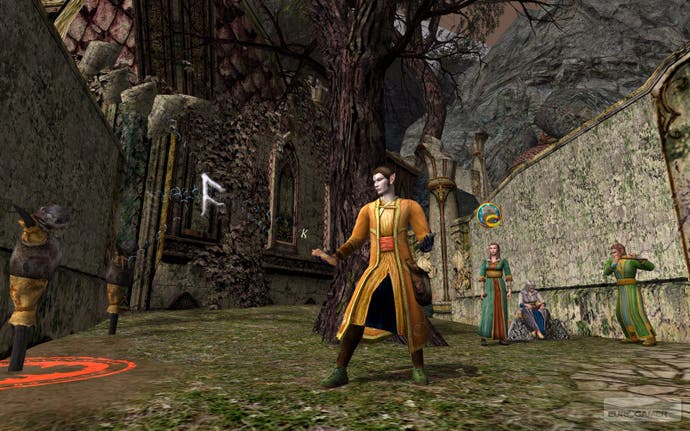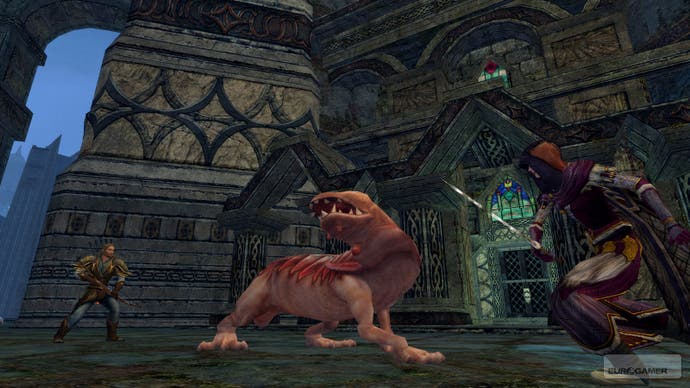The Lord of the Rings Online
Part one: looking back on LOTRO's first two years.
Sure!
Hahaha.
One of the first combat games we had was based around a card game. As your character advanced he acquired more and more cards and he placed these into your deck. As you progressed through combat you would be given random cards from your deck to build trumps and other ways to finish off your attacks and skills. That didn't test so well internally at first, so we looked at it as a table-top version and we looked at it in the actual game and realised very quickly that it was far too random and ended up not being very fun.
One of the other big changes was there started to be a lot more focus on the game itself. That sounds obvious, but it really was a big part of the transition that LOTRO became less about a sandbox Middle-Earth and more about an MMORPG with a significant game that propelled you forward through a compelling world. A lot of the early work was redesigning the game. But we also spent a lot of time focusing on how combat should work, because you spend so much of your time doing it in-game.
It was interesting as we were going through some of the same thought processes that Blizzard was about the MMO genre having the potential of becoming something larger than a small, narrowly-focused market.
Oh, you know, we'll never know. Don't think it hasn't crossed our minds once or twice! And we drive ourselves even more crazy by saying what if we launched before WOW and while the [Lord of the Rings] movies were coming out. Alan and I could have driven to work in our Porsches!

We made a lot of those decisions early on, saying that we weren't going to focus on wizards and weren't going to focus on other things. I wouldn't say it was damaging, but a lot of people may have passed us up because we didn't have high magic. But then again the Tolkien world isn't based on high magic, it's based on a very gritty and realistic style of world. We made a lot of these decisions and I don't think any have been bad at all.
Another big transformation that happened when we started working on the "new game" was a transformation of the community. That was a very difficult thing for us. There was a community that were very, very interested in just being, living and playing in Middle-Earth. They didn't want us to do anything that was anachronistic to the books. A game developer is either a god or a devil - there doesn't seem to be any in-between. And we were definitely a devil in the early days.
But as we started getting into beta, one of the most gratifying things for us was to see even that group of people start to say, "You know what? They didn't screw it up."
There's a million things that we wanted to include, but there's always a finite amount of time - at some point you need to actually bring the game to the audience. I'm pretty satisfied with the choices we made.
It's also about how do we evolve as the audience evolves, because we intend to be around for a very long time. Asheron's Call 1 is coming up on its 10th anniversary and 100th update. How do we evolve? Alan's very involved in that right now.
What I enjoy most about MMO design is that you're never done. Anything that you want in the game you can eventually get in the game. You can be as agile as you need to be to help your playerbase get the things they want. As a developer who has been making these games for as long as we have been, it gives us a bit of insight and ability to adjust and expand as needed.

It remains to be seen. Forever? We have a very loyal fanbase on AC1 that love playing the game and we don't see that waning.
That's the plan.
That is the plan. We've really only scratched the surface of what the books offer. We're at Moria right now and we've caught up with The Fellowship for the second time at Lorien. Can we fit it in ten years? I'd really like to fit it in using more time. We can continue to expand on the world as long as the material is there, and I'm sure everyone knows there is a wealth of material inside of Tolkien's work. We could go for 20 years, as long as the playerbase remains as avid as they are right now.
And not to forget our licence also includes The Hobbit, which we have only scratched the surface of. And the licence itself is going to be getting quite a shot in the arm publicly over the next few years as The Hobbit movie comes out and an unknown, unnamed, unclear second Hobbit-ish maybe title.
You start talking about a decade; I'm curious about where can we really go. There's another approach that says we work through our very recognisable content in five years or so and then let the community evolve and see what the world becomes; that's when it becomes interesting, seeing a living, breathing world that takes on a life of its own. We still have to do it within a licence, but the world itself is so complete you can imagine all kind of interesting things happening. How do players, someday, participate more in what that world actually is?
We have a million things that we would love to expand on that - given the laws of gravity and only having 24 hours in a day - we haven't yet. But everything from how housing can become neighbourhoods that can become something even more vast... We have all kinds of plans for things we want to do. It's just a matter of when.
Jeffrey: Ha! No one on the face of the planet has the licence to The Silmarillion. Don't look at it. Turn away.
Look out for part two of our Lord of the Rings Online interview, in which we talk about Book 8 and beyond, tomorrow.
